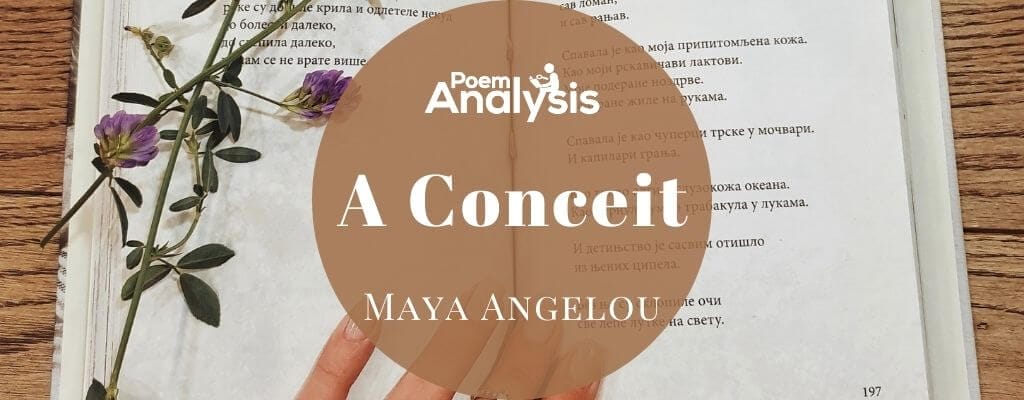‘A Conceit’ is a brief, but blunt, piece in which Angelou utilizes a commanding tone and staunch comparisons to indicate she is not interested in a superficial relationship or a fixation with the pain that one can bring. This adds a level of importance to her desires and strengthens the message of the poem that tangible and real are superior to superficial and despondent.
A Conceit Analysis
Stanza One and Two
Give me your hand
(…)
you
beyond this rage of poetry.
The simple statement of command, “Give me your hand,” existing as its own stanza—and the beginning stanza, no less—grounds the poem in a very concrete concept. For one thing, Angelou has directed this poem toward a specific person—“you”—which provides a sense of closeness the reader can feel as they read. In fact, even the command reads like it is, in fact, an order given to the reader. If this is the case, then the entirety of ‘A Conceit’ would be a representation of the relationship between Angelou and her readers, like she feels as though she could reach out and touch them through her “poetry,” and also that the reader is remarkably valuable to her because of this solid connection.
More likely, however, this notion of beginning the poem with such a command does not take away from the idea that Angelou is speaking about someone other than the reader. Instead, she could be talking directly to the person she clearly has a connection with, and the strategy of not bothering with the formalities of catering to “other” readers of the poem is an indication of how much she needs to say the things that are weighing on her mind. Even though “others” are watching on, no one is relevant except for Angelou and this “you.”
This concept is further supported when she notes that the situation goes “beyond this rage of poetry.” There is irony at work since this is, in fact, a poem, but the downplaying of the setup separates the rationale for this poem from something that is primarily literary or intended to draw in an audience. Rather, this is about Angelou’s feelings and relationship—things “beyond” the trivial matters of “poetry.”
That she would use “rage” to describe the world of “poetry” is relevant as well since that word has multiple meanings. It could mean fury, but also a popular trend. In this circumstance, the word choice seems to bring both meanings to the table. As the reader can find in the upcoming stanzas, Angelou does not hold a kind outlook on what she seems to consider the typical commentary on “love” from “poetry,” so by bluntly beginning with a command and trivializing the idea of “poetry,” she has created a fortress in which to deliver a direct and forceful contradiction to what she sees as a common theme in “poetry.”
Rather than Angelou’s idea of typical “poetry,” this poem is structured as something that shows connection and equality between Angelou and the person she is referencing. She wishes to take his “hand,” which is important enough to be the beginning of ‘A Conceit’, and she notes that she wants him to allow her “to lead and follow” him.
This “lead and follow” detail does contradict common notes of “poetry” of dwelling in heartache or putting a person so high on a pedestal that equality could never be achieved because Angelou is not asking to be either the adored or the adorer. She is, instead, insisting that she plays two roles within the relationship, “to lead and follow.” This hints that she is willing to be united in a mutual and equal way with this person rather than always being the focal point or always falling behind. Instead, she insists through her commanding tone that this relationship allows both participants to play both roles when varied needs arise.
Stanzas Three and Four
(…)
and love of loss
of love.For me
Give me your hand.
The commanding tone continues in this pair of stanzas so that there is no room for negotiation from Angelou. She is not requesting that these things happen but insisting on them, which notes the importance of these aspects in her mind. She has already established that there would be mutual “lead[ing] and follow[ing]” between the two, so to have such a commanding approach to her ideas is strong. It would seem that these concepts are so significant that she is insisting on “lead[ing]” through particular areas. Given her desire for equality in the relationship, this choice provides a hefty amount of importance to these concepts.
Also in these stanzas of ‘A Conceit’, the reader can note what was already suspected in earlier lines, which is that Angelou does not hold the greatest opinion of “poetry” in its references to “love.” Specifically, she claims “others have” “touching words and love of loss of love,” and when the next stanza is only to offer a contradictory desire for a relationship—“For me [g]ive me your hand”—it is obvious that what “others” have is not fitting for what she is seeking in this relationship. If the reader truly considers what those ideas from “others” and their “poetry” entail, that insistence on something different is sensible.
For one thing, “touching words” are intangible, and they can be spoken with little meaning behind them. They are not solid proof of “love,” which is contrasting to the idea of holding someone’s “hand.” That “hand” may not be proof on its own of “love,” but it is solid and real. This difference can be seen as a representation that Angelou wants something more stable and factual in the relationship than something that can be as unreliable as “words.”
The other aspect that Angelou criticizes of these poems is the “love of loss of love.” This would mean that “others” are more focused on portraying images and stories that reflect the ending of a relationship rather than the happy memories that could be the focus instead. Rather than writing about “love” and companionship, basically, these writers expound on the unhappiness of “los[ing]” that connection.
Together, these topics of “others” showcase different sides of the relationship spectrum—from the beauty of “love” through “touching words” and the “loss of love” that comes—but those concepts are lacking to Angelou. To her, she only wants to focus on the strong connection as it currently is, without burying it under “touching words” that are not as solid as that simple “hand” or fixating on the unhappiness that is linked to it. That connection to her “love” is what is important to her, something that is “beyond… poetry,” and the use of commands and contrasts certainly expresses that idea clearly to the reader.
Overall, the important aspect of the relationship is for it to be real and solid, and when such is the case, it is what matters over possible “loss.” Angelou then has chosen to focus on what is real and right before her instead of “los[ing]” that goodness in the midst of other “poet[ic]” devices.
About Maya Angelou
Maya Angelou was an author and a civil rights activist, among other details in her life. She penned various types of literary works and is one of America’s most well-known figures in literature. Beyond writing, she is also known for her work in television. She passed away in 2014.




